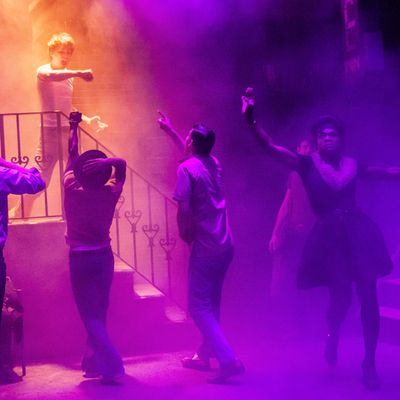
For years, critics have complained that American playwrights too rarely venture beyond the bedroom and living room to look for their subjects. Social movements, politics, community, and history fall outside our narcissistic comfort zone, it’s been thought. The Brits write about these things all the time, of course; they even lent us David Hare to pillory Bush & Co. in the Iraq War docudrama Stuff Happens. The only dissection of the Enron scandal I’m aware of came from London. Why can’t we manage as much at home?
Be careful what you wish for.
Hit the Wall, a new play set on the first night of the Stonewall riots in June 1969, at least tries, clearly hoping to pass itself off as both historical and political drama. If it fails on both counts, it’s not because the milieu isn’t rich. You’ve got your long-suffering minority erupting in rebellion, your colorful dramatis personae, your evergreen message of self-empowerment. You’ve even got a band playing songs that were available on the jukebox at the Stonewall Inn that night.
It turns out these are traps. Like other plays that have tried to encompass the riot rainbow — notably Street Theater by Doric Wilson, who at least was there — Hit the Wall succumbs to what Pauline Kael called the lifeboat problem, offering a pu pu platter of stock characters selected to represent each of the constituencies involved. On the side of the angels are two snappy swishes (one black, one Puerto Rican), a white butch, a black lesbian political organizer, a dreamy bisexual, an innocent hippie, and a drag queen in mourning for Judy Garland. These characters are all noble in their open-heartedness or at least witty in their aggrievement. (Garland’s death, the drag queen maintains, was an accident: “a long, long accident.”) On the other side are a policeman, a homophobe, and a predatory closet case known only as A-Gay, who gives would-be tricks five seconds to decide whether to accept his sexual favors. (“Take my hand. Shut your mouth. Follow my lead.”) He even wears a white polo shirt, which might as well be an SS uniform.
But then everyone here who isn’t good is categorically evil. In choosing to replace actual Stonewall participants with what he has called “full, fresh new characters,” the young playwright, Ike Holter, has left us not just with fictions but cartoons. It’s bad enough that this diminishes the underdogs who fought back that June; worse, it diminishes what they faced. Surely some policemen were as sadistic as the one (one!) represented, who brutalizes the butch lesbian in explicitly sexual ways. And surely some relatives of the rioters were as hateful as that butch’s homophobe sister, a vibrating nutjob who seems to have wandered onto the set from a modern-dress production of The Crucible. But the individual cops and disapproving relatives weren’t the problem; the world was. When Stonewall is depicted as a clash of personal beefs and psychopathologies, its momentousness is reduced to kitchen-sink drama. And while it’s obviously a difficult playwriting challenge to dramatize an all-pervasive system of repression, hey, Arthur Miller did it.
It doesn’t help that Eric Hoff’s staging is so skimpy, with just ten actors (and the three musicians) negotiating a tiny playing space meant to represent the tangle of Village streets intersecting in front of the bar. (Tina Landau’s 1994 Stonewall: Night Variations at least had the virtue of a 60-person cast on a huge pier on the Hudson.) Even leaving aside the performances, which would not be underscaled in an amphitheater, intimacy works against the material here. The climactic riot is both too little and too literal, with its wee choreography and psychedelic effects; instead of a Grand Guignol, it’s a diorama. No amount of stage smoke or strobe light can turn cutouts into history.
Hit the Wall is at the Barrow Street Theatre.




